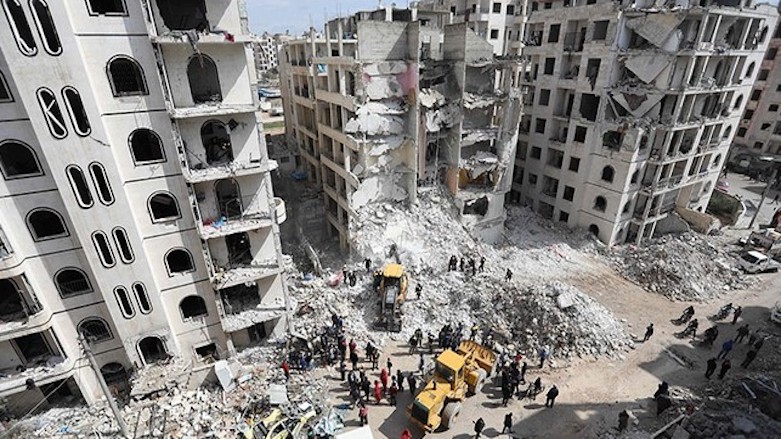Trump issues warning, as Syria, Russia press Idlib offensive and new refugee crisis looms

WASHINGTON DC (Kurdistan 24) – As Russian and Syrian forces continued their offensive to gain control of Idlib—the last rebel-held province in war-torn Syria—US President Donald Trump warned against indiscriminate attacks, causing large-scale civilian casualties.
“Russia, Syria, and Iran are killing, or on their way to killing, thousands of innocent civilians in Idlib Province,” Trump tweeted on Thursday. “Don’t do it! Turkey is working hard to stop this carnage.”
Over the past week, Syria and Russia have renewed their earlier advance on Idlib—which had been halted in August, after Russian President Vladimir Putin and Turkish President Recep Tayyip Erdogan reached agreement on terms for a ceasefire.
Although Trump included Iran in his tweet, and Tehran is a close ally of Syria and backs Shi’ite militias there, neither Iranian forces nor pro-Iranian militias appear to be involved in this offensive, The Washington Post noted.
Trump is spending a two week Christmas vacation at his Florida resort, Mar-a-Lago, from where he issued the warning.
New Refugee Crisis
On Sunday, Erdogan stated that some 80,000 Syrians were fleeing toward the Turkish border, ahead of the advancing Syrian troops.
"If the violence towards the people of Idlib does not stop, this number will increase even more,” Erdogan said. “In that case, Turkey will not carry such a migrant burden on its own.”
Threatening Europe, he continued, ”The negative effects of this pressure on us will be an issue felt by all European countries, especially Greece.”
In 2015, Europe was hit by a refugee crisis, with profound implications for the continent’s domestic politics, as over one million migrants arrived that year. The largest number came from Syria, followed by Iraq and Afghanistan.
“The migration wave, the largest Europe had seen since World War Two,” Reuters reported, “transformed Germany's and Europe's politics, spurring far-right, anti-immigration politicians into legislatures across the continent and fueling Britain's vote to leave the [European Union (EU).]”
Turkish Threats to Europe
Erdogan’s statement on Sunday appeared aimed at prodding Europe to support Turkey’s policy toward the Syrian refugees—although it is unclear if he seeks more financial support for the 3.6 million refugees already in Turkey; European backing for the large-scale movement of refugees into the so-called “safe zone” which Turkey has established in northeast Syria; or some combination of the two.
The effect of a large-scale transfer of the refugees into northeast Syria would be to create an Arab “belt,” dividing Kurdish-inhabited areas of Syria from Kurdish-inhabited areas of Turkey. Neither the US nor Europe has supported the idea.
Nonetheless, Erdogan said on Sunday, ”We call on European countries to use their energy to stop the massacre in Idlib, rather than trying to corner Turkey for the legitimate steps it took in Syria.”
German Chancellor Angela Merkel is planning to visit Turkey in January to discuss the situation in Syria, Germany’s Suddeutsche Zeitung reported on Thursday.
The German paper cited “media reports” that the Turkish coast guard has “reduced its controls,” thereby “making it easier for refugees to get to Greece,” in contravention of a 2016 agreement between Turkey and the EU.
In that accord, the EU agreed to provide 6 billion euros in humanitarian support for the refugees, while Turkey agreed to prevent their illegal emigration to Europe.
Last month, while visiting Hungary—before the latest Syrian-Russian offensive on Idlib—Erdogan called on EU governments to provide financial support for his plan to settle Syrian refugees in the “safe zone” in northeast Syria.
"Whether or not support comes, we will continue to host our guests, but only up to a point," Erdogan told reporters in Budapest. "If we see that this does not work, just like I said before, we will have no option left, but to open the gates.”
“If we open the gates, it is obvious where they will go," he concluded.
